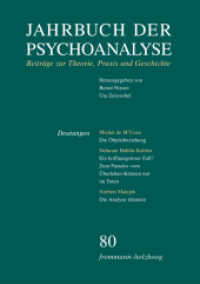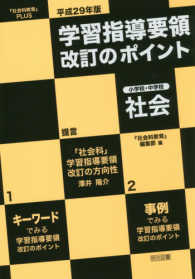- ホーム
- > 洋書
- > 英文書
- > Politics / International Relations
Full Description
This open access book crosses disciplinary boundaries to connect theories of environmental justice with Indigenous people's experiences of freshwater management and governance. It traces the history of one freshwater crisis - the degradation of Aotearoa New Zealand's Waipā River- to the settler-colonial acts of ecological dispossession resulting in intergenerational injustices for Indigenous Māori iwi (tribes). The authors draw on a rich empirical base to document the negative consequences of imposing Western knowledge, worldviews, laws, governance and management approaches onto Māori and their ancestral landscapes and waterscapes. Importantly, this book demonstrates how degraded freshwater systems can and are being addressed by Māori seeking to reassert their knowledge, authority, and practices of kaitiakitanga (environmental guardianship). Co-governance and co-management agreements between iwi and the New Zealand Government, over the Waipā River, highlight how Māori are envisioning and enacting more sustainable freshwater management and governance, thus seeking to achieve Indigenous environmental justice (IEJ).
The book provides an accessible way for readers coming from a diversity of different backgrounds, be they academics, students, practitioners or decision-makers, to develop an understanding of IEJ and its applicability to freshwater management and governance in the context of changing socio-economic, political, and environmental conditions that characterise the Anthropocene.
Contents
Chapter 1: Introduction.- Chapter 2: Environmental Justice and Indigenous Environmental Justice.- Chapter 3: 'The past is always in front of us': locating historical Māori waterscapes at the centre of discussions of current and future freshwater management.- Chapter 4: Remaking muddy blue spaces: histories of human-wetlands interactions in the Waipā River and the creation of environmental injustices.- Chapter 5: A history of the settler-colonial freshwater impure-ment: water pollution and the creation of multiple environmental injustices along the Waipā River.- Chapter 6: Legal and ontological pluralism: Recognising rivers as more-than-human entities.- Chapter 7: Transforming river governance: the co-governance arrangements in the Waikato and Waipā Rivers.- Chapter 8 Co-management in theory and practice: co-managing the Waipā River.-Chapter 9: Decolonising River Restoration: restoration as acts of healing and expression of rangatiratanga.- Chapter 10: Rethinking freshwater management in the context of climate change: planning for different times, climates, and generations.- Chapter 11: Conclusion: Spiralling forwards, backwards, and together to decolonise freshwater.








